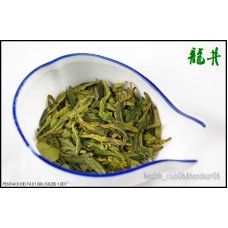Grade: C Chinese Green Tea Xi Hu Long Jing Dragon Well
Ex Tax: $16.00






Name: Dragonwell, Lung Ching ,Long Jing
Origin : Zhejiang Province,China
Grade : C
Rating : ★★★
Stockpiling :Sealed packaging OR Refrigerator freezer room. Dry and no direct sunshine.
Taste:Complex aroma and taste of floral sweetness with a hint of pleasant nutty note.
Appearance:Emerald-green young and tender tea leaves (mixture of one bud one leaf and one bud two leaves).
Production date:This year
Use By: One Year
expiration date:
This is bulk tea, it does not have a fixed shelf life. In general, we recommend that you drink it within one year
(from date of purchase).
Chinese Green tea is light and refreshing. Well known for its many health benefits, Chinese Green tea helps to prevent cancer, lowers cholesterol & blood pressure, strengthens the immune system, prevents cavities, reduces stress and regulates ageing.
The name Long Jing means "Dragon Well". This is truly a marvellous Green tea and one of the very first tea we offered for sale in TeaSpring. Even though it is not from Xihu area, this Long Jing still brews a cup of perfect tasting tea at a much more affordable price.
Lung Ching tea, also called "Dragon's Well," grows near the beautiful West Lake of Hangzhou on the only true tea "plantation" in China. A government-run business, the Lung Ching Tea Plantation is a popular tourist destination. The teas are described as being "...meticulously manufactured from the youngling buds and the tenderest leaves sprouting in the spring season." (Though, of course, tea is picked there at many times of the year.) There are many grades of Lung Ching tea, but all are distinguished by their flat, smooth appearance; emerald green color; fresh, fragrant aroma; and mellow, slightly sweet taste. Special Preparation
Longjing (Dragon Well) Tea is most famous for its unique fragrance and flavor; flat, slender strips of tea leaves in bright green liquid. Furthermore, Longjing tea aids one's health in many ways regardless of your age. It is used to deter food poisoning, refresh the body, stop cavities, fight viruses, control high blood pressure, lower the blood sugar level, and to prevent cancer. Hence, Longjing tea is regarded as the elixir for health and is widely sold and accepted all over the world. The name Longjing is from a small village on the Fenghuang Hill, in Hangzhou Zhengjiang Province. It is said that residents in ancient times believed that a dragon dwelled there and controlled the rainfall. As a result, people went there from all the surrounding areas whenever there was a drought to pray for rainfall, from as early as the Three Kingdoms Period (221-280).
Longjing tea is grown in the Longjing mountain area of Hangzhou, southwest of the West Lake. The fertile land is both rich in phosphorus and sub-acidic sand. This region prevents the cold current from the north and holds back the warm current from the south, thus the growing area of Longjing tea can be coated by cloud and mist for long periods of time. With such favorable growing conditions, needless to say, Longjing tea is considered the best tea in China.
The tea has a long history; more than 1000 years. Its earliest record may be found in the book named chajing, the first book on tea in the world, written by the Chinese expert of the Tang Dynasty (618-907), Lu Yu. Longjing tea was not given its name until the Southern Song Dynasty. Hangzhou as the capital of the country carried out further development in tea production. Knowledge of the tea began to spread and became known all over the country by the times of the Yuan and Ming Dynasties.
Especially in the Qing Dynasty, the fame of Longjing tea became widespread throughout the country. One of the most remarkable emperors of the Qing Dynasty, Qianlong, paid four visits to the growing area of Longjing tea, not only to enjoy sipping tea, and to write and sing poems to praise the tea, but also to watch the process of picking and roasting it with serious intent. He was so interested in Longjing tea that he named the eighteen tea trees in front of the Hugong Temple "royal tea". From that time forward, the tea became increasingly popular for everyone.
By the early 20th century, Longjing tea was witnessing its highest popularity in history. The Chinese government has made a great effort to promote it and introduce advanced technology in planting, picking and roasting of the tea since the founding of the People's Republic of China in 1949. Subsequently, a high quality standards system for tea grading was set up. All these innovations contributed to the standardization of the tea production.
According to local custom, the right time for picking the tea leaves is very short. The period between Qing Ming and Grain Rain (from April 5 to 21) each year is generally considered the prime time to get the highest quality Longjing tea. The brewing method we highly recommended is to put a pinch of dry, roasted tea leaves into a porcelain or transparent glass cup and pour hot water at about 85C into the cup. Sip and enjoy!
In conclusion, Longjng tea is famous both because of its good quality, as well as its historical interest and the cultural connotation it has endured. Chinese Longjing tea has not only the value of tea when it is consumed, but it is also the symbol of cultural values of China.
Write a review
Your Name:Your Review: Note: HTML is not translated!
Rating: Bad Good
Enter the code in the box below:





